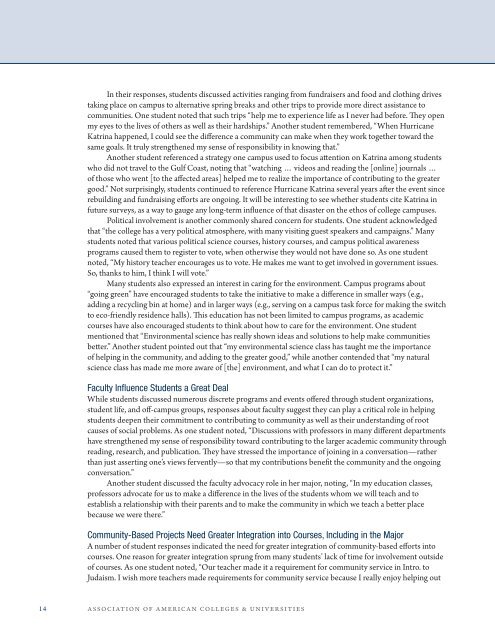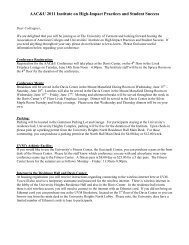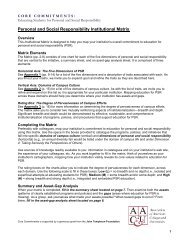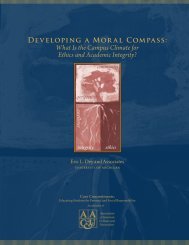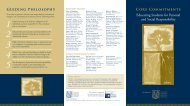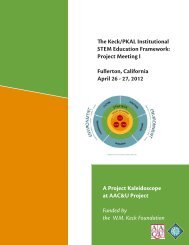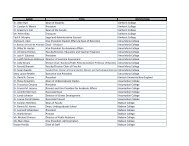Civic Responsibility: - Association of American Colleges and ...
Civic Responsibility: - Association of American Colleges and ...
Civic Responsibility: - Association of American Colleges and ...
Create successful ePaper yourself
Turn your PDF publications into a flip-book with our unique Google optimized e-Paper software.
In their responses, students discussed activities ranging from fundraisers <strong>and</strong> food <strong>and</strong> clothing drives<br />
taking place on campus to alternative spring breaks <strong>and</strong> other trips to provide more direct assistance to<br />
communities. One student noted that such trips “help me to experience life as I never had before. They open<br />
my eyes to the lives <strong>of</strong> others as well as their hardships.” Another student remembered, “When Hurricane<br />
Katrina happened, I could see the difference a community can make when they work together toward the<br />
same goals. It truly strengthened my sense <strong>of</strong> responsibility in knowing that.”<br />
Another student referenced a strategy one campus used to focus attention on Katrina among students<br />
who did not travel to the Gulf Coast, noting that “watching … videos <strong>and</strong> reading the [online] journals …<br />
<strong>of</strong> those who went [to the affected areas] helped me to realize the importance <strong>of</strong> contributing to the greater<br />
good.” Not surprisingly, students continued to reference Hurricane Katrina several years after the event since<br />
rebuilding <strong>and</strong> fundraising efforts are ongoing. It will be interesting to see whether students cite Katrina in<br />
future surveys, as a way to gauge any long-term influence <strong>of</strong> that disaster on the ethos <strong>of</strong> college campuses.<br />
Political involvement is another commonly shared concern for students. One student acknowledged<br />
that “the college has a very political atmosphere, with many visiting guest speakers <strong>and</strong> campaigns.” Many<br />
students noted that various political science courses, history courses, <strong>and</strong> campus political awareness<br />
programs caused them to register to vote, when otherwise they would not have done so. As one student<br />
noted, “My history teacher encourages us to vote. He makes me want to get involved in government issues.<br />
So, thanks to him, I think I will vote.”<br />
Many students also expressed an interest in caring for the environment. Campus programs about<br />
“going green” have encouraged students to take the initiative to make a difference in smaller ways (e.g.,<br />
adding a recycling bin at home) <strong>and</strong> in larger ways (e.g., serving on a campus task force for making the switch<br />
to eco-friendly residence halls). This education has not been limited to campus programs, as academic<br />
courses have also encouraged students to think about how to care for the environment. One student<br />
mentioned that “Environmental science has really shown ideas <strong>and</strong> solutions to help make communities<br />
better.” Another student pointed out that “my environmental science class has taught me the importance<br />
<strong>of</strong> helping in the community, <strong>and</strong> adding to the greater good,” while another contended that “my natural<br />
science class has made me more aware <strong>of</strong> [the] environment, <strong>and</strong> what I can do to protect it.”<br />
Faculty Influence Students a Great Deal<br />
While students discussed numerous discrete programs <strong>and</strong> events <strong>of</strong>fered through student organizations,<br />
student life, <strong>and</strong> <strong>of</strong>f-campus groups, responses about faculty suggest they can play a critical role in helping<br />
students deepen their commitment to contributing to community as well as their underst<strong>and</strong>ing <strong>of</strong> root<br />
causes <strong>of</strong> social problems. As one student noted, “Discussions with pr<strong>of</strong>essors in many different departments<br />
have strengthened my sense <strong>of</strong> responsibility toward contributing to the larger academic community through<br />
reading, research, <strong>and</strong> publication. They have stressed the importance <strong>of</strong> joining in a conversation—rather<br />
than just asserting one’s views fervently—so that my contributions benefit the community <strong>and</strong> the ongoing<br />
conversation.”<br />
Another student discussed the faculty advocacy role in her major, noting, “In my education classes,<br />
pr<strong>of</strong>essors advocate for us to make a difference in the lives <strong>of</strong> the students whom we will teach <strong>and</strong> to<br />
establish a relationship with their parents <strong>and</strong> to make the community in which we teach a better place<br />
because we were there.”<br />
Community-Based Projects Need Greater Integration into Courses, Including in the Major<br />
A number <strong>of</strong> student responses indicated the need for greater integration <strong>of</strong> community-based efforts into<br />
courses. One reason for greater integration sprung from many students’ lack <strong>of</strong> time for involvement outside<br />
<strong>of</strong> courses. As one student noted, “Our teacher made it a requirement for community service in Intro. to<br />
Judaism. I wish more teachers made requirements for community service because I really enjoy helping out<br />
14<br />
association <strong>of</strong> american colleges & universities


